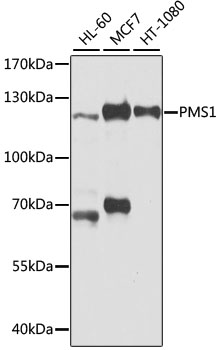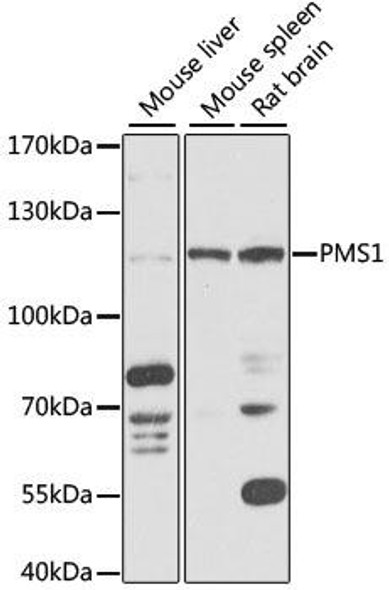Anti-PMS1 Antibody (CAB2183)
- SKU:
- CAB2183
- Product type:
- Antibody
- Reactivity:
- Human
- Host Species:
- Rabbit
- Isotype:
- IgG
- Research Area:
- Epigenetics and Nuclear Signaling
Frequently bought together:
Description
| Antibody Name: | Anti-PMS1 Antibody |
| Antibody SKU: | CAB2183 |
| Antibody Size: | 20uL, 50uL, 100uL |
| Application: | WB |
| Reactivity: | Human |
| Host Species: | Rabbit |
| Immunogen: | Recombinant fusion protein containing a sequence corresponding to amino acids 405-619 of human PMS1 (NP_000525.1). |
| Application: | WB |
| Recommended Dilution: | WB 1:500 - 1:2000 |
| Reactivity: | Human |
| Positive Samples: | HL-60, MCF7, HT-1080 |
| Immunogen: | Recombinant fusion protein containing a sequence corresponding to amino acids 405-619 of human PMS1 (NP_000525.1). |
| Purification Method: | Affinity purification |
| Storage Buffer: | Store at -20°C. Avoid freeze / thaw cycles. Buffer: PBS with 0.02% sodium azide, 50% glycerol, pH7.3. |
| Isotype: | IgG |
| Sequence: | DCLN HQIS IGDF GYGH CSSE ISNI DKNT KNAF QDIS MSNV SWEN SQTE YSKT CFIS SVKH TQSE NGNK DHID ESGE NEEE AGLE NSSE ISAD EWSR GNIL KNSV GENI EPVK ILVP EKSL PCKV SNNN YPIP EQMN LNED SCNK KSNV IDNK SGKV TAYD LLSN RVIK KPMS ASAL FVQD HRPQ FLIE NPKT SLED ATLQ IEEL WKTL SEEE KLK |
| Gene ID: | 5378 |
| Uniprot: | P54277 |
| Cellular Location: | Nucleus |
| Calculated MW: | 62kDa/86kDa/101kDa/105kDa |
| Observed MW: | 110kDa |
| Synonyms: | PMS1, HNPCC3, MLH2, PMSL1, hPMS1 |
| Background: | This gene encodes a protein belonging to the DNA mismatch repair mutL/hexB family. This protein is thought to be involved in the repair of DNA mismatches, and it can form heterodimers with MLH1, a known DNA mismatch repair protein. Mutations in this gene cause hereditary nonpolyposis colorectal cancer type 3 (HNPCC3) either alone or in combination with mutations in other genes involved in the HNPCC phenotype, which is also known as Lynch syndrome. |
| UniProt Protein Function: | PMS1: Probably involved in the repair of mismatches in DNA. Defects in PMS1 are the cause of hereditary non-polyposis colorectal cancer type 3 (HNPCC3). Mutations in more than one gene locus can be involved alone or in combination in the production of the HNPCC phenotype (also called Lynch syndrome). Most families with clinically recognized HNPCC have mutations in either MLH1 or MSH2 genes. HNPCC is an autosomal, dominantly inherited disease associated with marked increase in cancer susceptibility. It is characterized by a familial predisposition to early onset colorectal carcinoma (CRC) and extra-colonic cancers of the gastrointestinal, urological and female reproductive tracts. HNPCC is reported to be the most common form of inherited colorectal cancer in the Western world, and accounts for 15% of all colon cancers. Cancers in HNPCC originate within benign neoplastic polyps termed adenomas. Clinically, HNPCC is often divided into two subgroups. Type I: hereditary predisposition to colorectal cancer, a young age of onset, and carcinoma observed in the proximal colon. Type II: patients have an increased risk for cancers in certain tissues such as the uterus, ovary, breast, stomach, small intestine, skin, and larynx in addition to the colon. Diagnosis of classical HNPCC is based on the Amsterdam criteria: 3 or more relatives affected by colorectal cancer, one a first degree relative of the other two; 2 or more generation affected; 1 or more colorectal cancers presenting before 50 years of age; exclusion of hereditary polyposis syndromes. The term 'suspected HNPCC' or 'incomplete HNPCC' can be used to describe families who do not or only partially fulfill the Amsterdam criteria, but in whom a genetic basis for colon cancer is strongly suspected. Belongs to the DNA mismatch repair MutL/HexB family. 3 isoforms of the human protein are produced by alternative splicing. |
| UniProt Protein Details: | Protein type:Tumor suppressor; DNA repair, damage Chromosomal Location of Human Ortholog: 2q31.1 Cellular Component: MutLalpha complex; nucleus Molecular Function:DNA binding; ATPase activity; ATP binding; single-stranded DNA binding; mismatched DNA binding Biological Process: response to drug; mismatch repair Disease: Lynch Syndrome I |
| NCBI Summary: | This gene encodes a protein belonging to the DNA mismatch repair mutL/hexB family. This protein is thought to be involved in the repair of DNA mismatches, and it can form heterodimers with MLH1, a known DNA mismatch repair protein. Mutations in this gene cause hereditary nonpolyposis colorectal cancer type 3 (HNPCC3) either alone or in combination with mutations in other genes involved in the HNPCC phenotype, which is also known as Lynch syndrome. [provided by RefSeq, Jul 2008] |
| UniProt Code: | P54277 |
| NCBI GenInfo Identifier: | 1709683 |
| NCBI Gene ID: | 5378 |
| NCBI Accession: | P54277.1 |
| UniProt Related Accession: | P54277 |
| Molecular Weight: | |
| NCBI Full Name: | PMS1 protein homolog 1 |
| NCBI Synonym Full Names: | PMS1 homolog 1, mismatch repair system component |
| NCBI Official Symbol: | PMS1 |
| NCBI Official Synonym Symbols: | MLH2; PMSL1; hPMS1; HNPCC3 |
| NCBI Protein Information: | PMS1 protein homolog 1 |
| UniProt Protein Name: | PMS1 protein homolog 1 |
| UniProt Synonym Protein Names: | DNA mismatch repair protein PMS1 |
| Protein Family: | PMS1 protein |
| UniProt Gene Name: | PMS1 |
| UniProt Entry Name: | PMS1_HUMAN |








